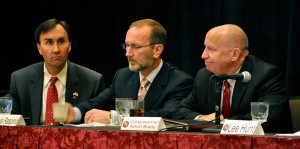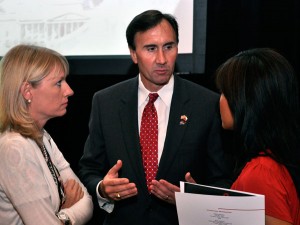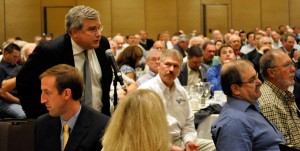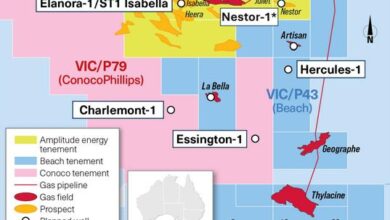Congressmen join drilling industry in town hall meeting, pledge support to fight drilling moratorium

Texas Congressmen Pete Olson and Kevin Brady joined the drilling industry in a town hall meeting held by IADC on 7 July in Houston. Both lawmakers pledged their support for the energy industry in fighting the Gulf of Mexico drilling moratorium, but also encouraged the industry to work harder at getting its message out. As Congressman Brady told the audience of nearly 300 people: “If every one of you isn’t meeting with a local lawmaker in the next three weeks, shame on you.”
In providing opening remarks, IADC 2010 chairman Louis Raspino, Pride International, noted the urgency of the situation. “The small businesses that hold the big players together – they can’t afford six months of no revenue. … In a very short period of time, we’re going to see this industry implode. That’s the message we’re bringing to Washington.”

IADC recently formed the Deepwater Coalition, which is working with congressional members to help them understand what industry is doing to improve safety and the dire economic implications of a deepwater drilling moratorium.

These efforts were recognized by Congressman Brady, who praised the “thoughtful, reasoned responses” that IADC has taken to Washington in recent weeks. Nevertheless, because the industry’s problem is political, the association’s efforts alone will not be enough.
“The energy industry has been demonized for years. It’s not just because people don’t understand it. It’s because there’s no political price for damaging your industry,” Congressman Brady said. “They don’t see energy workers – they just see energy executives. So they feel free to undercut the two million workers in this industry because they don’t think they have any energy workers in their districts.”
“If we’re going to turn this around, you can’t just leave it to your leadership,” he continued. “You’ve got to take the message to every lawmaker in Congress. You have to do it in their home communities, not Washington.”
He warned that Congress is not likely to leave for recess without passing some kind of legislation on offshore safety, and it’s up to the industry to intercede. “If you will take that step to get in front of a lawmaker in their community and tell them about the jobs, I guarantee you that will help turn this thing around. There is no substitute for it. E-mails won’t work. Phone calls won’t work. There is no substitute for face-to-face contact.

“My goal here today is to tell you: We will fight for you in Washington on every one of these issues, but you’ve got to fight for yourselves, and the way to do it is to get engaged because this is a matter of survival for the industry.”
Congressman Olson also voiced his support for the industry, reiterating the fact that the drilling moratorium will do nothing to make deepwater drilling any safer yet will do everything to damage the US economy. “There’s another motivation here, and it’s not the safety of the rigs,” he said.
“Quite frankly, this is a misguided policy that destroys an entire industry. It’s the equivalent of shutting down all coal mines after the tragic mine collapse in West Virginia that took the lives of 25 miners before you even have a clue as to why it actually happened,” he said.

He also warned the industry about an oil spill bill under way in the House Transportation & Infrastructure Committee that would, among other things, repeal the $75 million liability limit on offshore facilities. As a member of that committee, Congressman Olson proposed an alternative that would consider the risks of each rig separately, taking into account factors such as well depth, well pressures and the company’s safety record.
“I know this is not an ideal solution, but it’s a more reasoned approach rather than doing away with the liability limits that would effectively squeeze out small operators, leaving room for only the big ones. … I’m committed to making sure that we have a bill that does not kill more jobs or harm the industry even further,” he said.
Industry efforts

Two technical experts joined Congressman Olson and Brady at the town hall meeting, describing their involvement with the government’s safety recommendations following the 20 April blowout. Moe Plaisance, Diamond Offshore, led one of two work groups under the Joint Industry Task Force formed by IADC and API. The group was tasked with providing recommendations to Secretary Salazar on how existing equipment could be used to improve offshore safety. “Our charter was to look at the deepwater industry as it was, without concentrating on the Macondo problems,” Mr Plaisance said.
Although the task force’s recommendations were accepted by Secretary Salazar – in fact, most of the Secretary’s report to the president was based on those recommendations – things didn’t turn out as the group expected, Mr Plaisance recalled. “It was (used as) justification for not letting us go to work rather than improving safety,” he said.

Despite that disappointment, the work of the task force was later used to better effect in the Safety NTL issued by MMS in early June, and the task force has planned another meeting to “dissect what was not covered in NTL No. 5 but was covered in the Secretary’s safety report,” Mr Plaisance said. His goal is to draft further safety recommendations for the Department of Interior and the new Bureau of Ocean Energy before they issue an “interim final rule,” expected within 90 days.
The final speaker of the meeting was Tom Williams, Nautilus International, who provided comments on his work as part of a group of scientists who reviewed recommendations for Secretary Salazar’s safety report. Mr Williams emphasized that this group of scientists did not recommend a blanket drilling moratorium, as was implied by the final report submitted to the president. “In fact, everybody recommended that it wasn’t the answer. Everybody also recommended that it will not measurably reduce the risk,” he said.
By implying that these scientists did recommend the moratorium, they “really felt like they had been taken advantage of,” Mr Williams said. “I believe now the only solution for this is to put some political pressure on the White House, who’s making this decision.”
To write to your congressional representative or senator, model letters can be found on IADC’s Offshore GOM Reform website.




